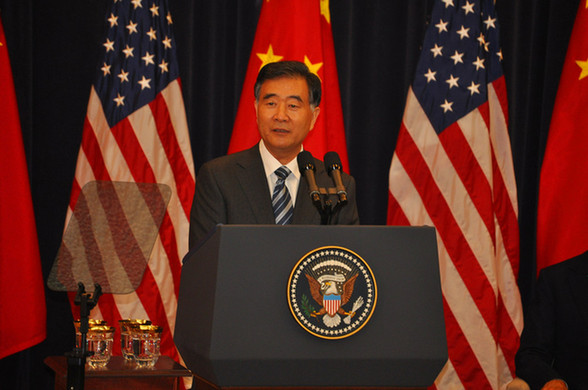China, US start key annual dialogue on bilateral ties
 0 Comment(s)
0 Comment(s) Print
Print E-mail China.org.cn, July 11, 2013
E-mail China.org.cn, July 11, 2013
|
Chinese Vice Premier Wang Yang speaks during the opening session of the fifth round of the China-U.S. Strategic and Economic Dialogue (S&ED) in Washington DC, on Wednesday, July 10, 2013. Acting as special representatives of Chinese President Xi Jinping, Chinese Vice Premier Wang Yang and State Councilor Yang Jiechi will co-chair the two-day dialogue with U.S. President Barack Obama's special representatives Secretary of State John Kerry and Treasury Secretary Jacob Lew.[CRI] |
The fifth round of the China-U. S. Strategic and Economic Dialogue (S&ED) started in Washington on Wednesday, as the two-day event will see leading officials from more than 20 departments and ministries of both countries talk on a wide range of topics covering political, security, economic and financial issues.
Acting as special representatives of Chinese President Xi Jinping, Chinese Vice Premier Wang Yang and State Councilor Yang Jiechi will co-chair the dialogue with U.S. President Barack Obama 's special representatives Secretary of State John Kerry and Treasury Secretary Jacob Lew.
Wang and Lew will co-chair the economic track talks, while Yang and Kerry will co-host the strategic track talks.
Speaking at the joint opening session of the S&ED, U.S. Vice President Joe Biden said the two countries have their disagreements. "But if we are straightforward, clear and predictable with one another, we can find solutions that work for both of us."
As U.S. and Chinese economies are increasingly interconnected, dialogue is better than confrontation and is important for both countries, Wang said at the event.
Good cooperation between China and the United States, the biggest developing country and biggest developed country respectively, "can serve as an anchor for world peace and stability and an engine for prosperity and development," he said.
Xi and Obama met in California in June and reached consensus to build a new type of relations between major countries.
"Our job, in this forum of the S&ED, is to turn the important agreement between the two presidents into tangible outcomes and add substances to this new model of major country relationship so as to bring benefits to the people of the two countries and the world around," Wang said.
The S&ED has served as an important platform for the two countries to enhance mutual trust, expand cooperation and manage differences, he said, adding that over the past four years, the two sides have had close communication and candid discussions on issues of long-term strategic and overarching importance.
The fifth round of S&ED now stands at a new starting point as the two nations have both entered a new era of development and come together to explore a new type of relations between major countries, Yang said.
China and the United States have been holding the annual S&ED talks since 2009 when Obama came to power, as a major channel of communication to enhance mutual trust, boost cooperation and properly handle differences.
The S&ED is critical to generating practical cooperation on issues across the bilateral relationship and a place where the two nations can make real progress, Lew said at the event.
"We meet at a time when the citizens in both of our countries are looking to their policy makers to advance policies that lead to greater prosperity, equity, and opportunity," he said.
Highlighting that the first S&ED was a "landmark event," Kerry said "with each passing year, we've been able to build on this dialogue."
The two sides have made the S&ED the key mechanism for managing cooperation and competition between the two countries. "Our agenda is broad and it cuts across strategic and economic tracks. And as an outgrowth of the S&ED, we've added the strategic security dialogue in 2011 and new working groups on cyber issues and on climate change this year," Kerry said.
The S&ED mechanism was upgraded from former Strategic Dialogue and biennial Strategic Economic Dialogue, which were initiated by the two heads of state in 2005 and 2006 respectively.
Xie Zhenhua, deputy head of China's economic planner National Development and Reform Commission, told reporters after the opening session that a working group on climate change, which was initiated after the visit of Kerry to China in April, has identified five priority areas including promoting smart grids to step up bilateral cooperation.
Some U.S. experts regard this dialogue, the first cabinet-level talks since the government reshuffles in both countries early this year, as a good chance for senior Chinese and U.S. officials to get to know each other and set up working relationship.
The full slate of issues up for discussion will have multilateral impact and the entire global community is vested in their outcome, said Kenneth Lieberthal, a senior fellow at the Washington-based Brookings Institution.







Go to Forum >>0 Comment(s)